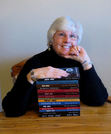Melissa Bowersock's Blog, page 25
February 12, 2013
Author Interviews - Tips and Tricks
This is a great time to be an indie writer. We have the whole wide world available to us as our market place via the internet, and there are a ton of ways to get the word out about us and our books. The burgeoning influence of blogs has spawned a mini-industry of author interviews, a particularly friendly, chatty way to connect with all our readers. Author interviews can be interesting, educational, informative and fun. After reading many and taking part in quite a few, however, I have realized that, like anything else, there are good ones and some not so good.
What’s the difference?
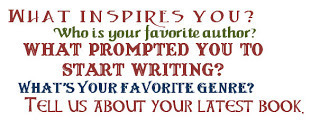
For the Interviewee
Ok, we authors are not really used to standing directly in the glare of the limelight. We tend to hold our books up in front of us like a mask while we hide behind them and peek out shyly at the readers. After all, we’re selling our books, not … us. Right?
Yes and no. Of course we’re selling our books, but the fact is that readers tend to buy more books from authors they perceive as being likeable. They can get that impression from our books―from the tone, from the story resolution, from the moral stand of the main characters, but author interviews give them greater access into our hearts and minds. I don’t know about you, but after I read the first Harry Potter book, I really wanted to sit down with J. K. Rowling and ask her just how she came up with all that amazing stuff. Author interviews offer a taste of that kind of one-on-one conversation readers often crave.
So this is your chance to shine on your own, no book in front of your face.
Ulp!
Ok, just breathe. In. Out. It’ll be fine.
The first thing to remember is that, even though you’re being asked questions by the interviewer, this is about more than imparting information. Sure, you’re answering the questions, but do it in an entertaining manner. You’re a writer, for Pete’s sake—write like one! Each question is a chance to tell a mini-story, to expound, to weave, to fascinate as well as explain. I can’t tell you how many times I’ve seen something like this:
Q. Did you do a lot of research for your book?A. No.
Really?That’s all you’ve got? Come on, you’ve just missed a great opportunity to talk about that time you got lost in the stacks at the public library and almost got locked in for the night. Or that time you took a road trip through New Mexico looking for a locale to match your character’s home town and you almost got beamed up by a flying saucer outside of Roswell. This is about more than giving information—it’s about showing us your craft.
Sometimes I think writers fail to understand that the medium of the internet—text—gives them boundless opportunities to show their off their talent or expose their lack of imagination. When I see a writer in one of the many writers’ forums online comment, What r u talking about? I can write as gud as anyone, I just have to cringe. If this is a sample of their writing, who would even think of picking up their book? Yes, we live in the age of texts; yes, we’re used to tossing off all the abbreviated shortcuts, but don’t.
Just don’t.
Every chance we have to write, whether on paper or on the internet, is an opportunity to show our mettle. Don’t blow it off. Don’t hunker down and make the interviewer drag it out of you. Get up there and shine!
For the Interviewer
As for the interviewer, you have the opportunity to open up that author in unexpected ways. I know it’s easy to gravitate to the general questions every interviewer asks—Who’s your favorite author? What’s your favorite genre? —but you are also in the position to make your interview unique. Spark up that interview by making the author think. Delve deep; draw him or her out of their shell. Here are a few suggestions:
Ask open-ended questions. Don’t ask yes-or-no questions like the one above. Instead ask, “What’s your process when you’re researching a book?”
Focus on the author. If you’ve taken the time to read some of the author’s work and checked out their webpage or blog, you can ask very specific questions about them and their work. For example: “In your new book, Hell on Wings, your main character base-jumps off a thousand-foot cliff naked with his hair on fire. What kind of research did you do for that scene?”
Not only is the reader going, “Whoa, never saw that in an interview before,” but the answer is giving the reader the behind-the-scenes glimpse that expands his reading experience. It’s like watching “The Making of ...” section on the DVD after you’ve watched the movie. Very often knowing the story behind the story gives you a greater appreciation and a more textured experience of the original movie. And in the above case, if the reader has not already read this particular book, this question just might move them to buy it.
So enough of the generic one-size-fits-all interviews. Get creative—on both sides of the interview!
Bonus: what questions would you like to see asked? Comment below, and thanks!
Published on February 12, 2013 06:16
January 29, 2013
What Would YOU Do?
Ok, I’ve been toying with an idea for a new book for a while now, and although I admit I have not given a ton of thought to it, I get stuck trying to figure out what direction it will/could/should go. Before I ask the reading faithful to chime in, let me give a little background.
Those of you who follow me or have read my book Queen’s Gold know that I am a hypnotherapist and past-life regressionist. What the heck does that mean? It means I take people back to their past lives under hypnosis. I know, woo-woo, right? Ok, it’s not Western mainstream thought, but actually there are more people who believe in reincarnation in the world than those who don’t. I’ve reviewed over 20 of my own past lives and I’ve found it to be an interesting and satisfying plot device for a keep-‘em-guessing story.

So one day I was thinking about good and evil and how it all shakes out in the big picture and a random thought crossed my mind—what if Hitler were reincarnated? After all, I’m assuming he was a regular person before an abusive childhood, paranoid beliefs and a country ripe for kidnapping all converged and he turned into a monster. I’m assuming his soul follows the same rules of Karma that all our souls do, and if that’s true, then he would definitely reincarnate in order to learn, grow and reach his full potential. I’m pretty sure being the greatest mass murderer in the history of the planet would not be his soul’s ultimate goal. So if he was reincarnated … who would he come back as?
I reasoned that the most surprising and interesting result would be for him to come back as something far removed from what he was, yet going to the exact opposite would be too pat. Many people think Karma is a tit-for-tat kind of thing, so if you murder in one life, you are murdered in the next. Actually it’s much more subtle and complex than that, and it can take many, many lives to resolve an issue.
What I came up with is … (drumroll, please) … a housewife. In Poughkeepsie. Maybe Des Moines. Thirty-something, two tweener kids, husband is a banker or an engineer or maybe a salesman. Ordinary. Normal. Until she finds out …
(Jawsmusic here … duh DUM; duh DUM …)
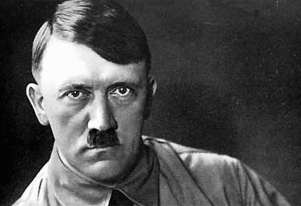
I picture her balancing housekeeping and shopping with chauffeuring kids to soccer games and supporting husband through pay cuts brought on by the recession. She also struggles with her weight. In an uncharacteristic grab for some control over the life that has morphed away from her dreams, she sees a hypnotist, but during the course of the weight loss session, the stunning nature of her soul reveals itself.
Her first reaction, of course, is total disbelief. She has no interest in reincarnation. She’s … Baptist … or Methodist, maybe even Jewish, whatever. But religion for her is like background music; she can hear it if she focuses on it, but otherwise it just gets lost in the noise of daily life. Being presented with this silly wild imagining does not send her screaming for church. She’s a pragmatist. She goes home and washes a load of laundry.
But the thoughts don’t go away.
So here’s my question to you: If you found out you were the reincarnation of Hitler, what would you do? What would you think? How would you feel?
I would love to have your comments below. I’m dying to hear how this is going to come out!
Published on January 29, 2013 09:35
January 28, 2013
Interview by Clancy Tucker
I'm re-blogging the very nice interview by my down-under buddy Clancy Tucker. Interesting, different, thoughtful questions. Clancy blogs daily and has a lot of interesting folks drop by for a chat. http://clancytucker.blogspot.com.au/2013/01/21-january-2013-melissa-bowersock-guest.html .
1. TELL US A LITTLE ABOUT YOURSELF AND YOUR WRITING JOURNEY.
My first two books were published by a New York house in the 80’s; these were both historical romances. From there I switched genres and was surprised to find that doing that threw me to the back of the line as far as publishers were concerned. Luckily my next three books were published by small presses, taking up the slack as the big houses got more and more reticent about non-celebrity writers. Finally I moved into self-publishing and have published my last five books that way.
2. WHEN AND HOW DID YOU BECOME A WRITER?
I’ve been writing since I was 5. I remember my mother reading a little story I wrote about bunny rabbits and her asking me how I knew about using quotes for dialog. I had just noticed how they were used in stories I read, so I copied that. Apparently I was born with stories inside of me!
3. WHAT DO YOU ENJOY MOST ABOUT BEING A WRITER?
The best part about being a writer is when the story comes alive and takes off on its own. I know this is hard for non-writers to understand; after all, I’m writing the confounded thing, how can it do something I don’t know about? But it’s true, and that is where the magic comes in. When I was writing Goddess Rising , I found myself writing things that I didn’t really understand the need for, but later on those same elements came back into play. By the same token, I thought my current work in progress (WIP) was going to be a light comedy. It has become instead a fairly dark drama. Just goes to show that the stories will be told how they want, not how I want!
4. WHAT IS THE HARDEST THING ABOUT BEING A WRITER?
Keeping at it. Writing is a very isolated and isolating process; we writers live inside our heads and there are no cheerleaders there. Sometimes it’s difficult to get back to a story, to keep chipping away at it, sentence by sentence. Sometimes it seems like I’ll never get through to the end, but I just have to keep working. Because it’s creative, it’s not a mechanical process like taking inventory or ordering supplies, and it’s more mentally and emotionally draining than non-creative jobs.
5. WHAT WERE YOU IN A PAST LIFE, BEFORE YOU BECAME A WRITER?
I have a feeling for most people this question is more allegorical than literal. However, being a hypnotherapist and having reviewed about 20 of my past lives (and my book Queen’s Gold is based on a past-life hypnotic regression), I can lay a pretty good claim to my past life history. I’ve lived in Iceland, Africa, Ireland, Greece, Egypt, Arabia, Mexico, Germany, Palestine, Minnesota, Tibet, South Dakota and the American Southwest. I’ve been an American Indian (female), a scholar and ceramicist (female), an Arabian prince (male), a settler (female), a priest (male), a stable hand (male), a religious agitator (female), and a temple guardian (male). My most recent past life was in the first half of the 20th century when I was a female artist living in Kansas. (And no, I’ve never been anyone famous!)
6. WHAT IS YOUR GREATEST WRITING ACHIEVEMENT?
I’ve been happily surprised at the recognition my latest book, Marcia Gates: Angel of Bataan , has received. This is the true story of my aunt, an Army nurse and a prisoner-of-war during World War II. It was nominated for a biography award by the Military Writers Society of America and while it did not win the top prize, it was awarded an Honorable Mention. Shortly after that, I was contacted by a TV producer who was making a documentary about the military history of Wisconsin (my aunt’s home state) and wanted to feature her and my book in the program. It’s been extremely gratifying to see how the book touches people, and I love the fact that it’s keeping my aunt’s story and the history alive.
7. WHAT ARE YOU WORKING ON AT THE MOMENT?
Currently I’m working on a ghost story. It’s about a ghost who was transported from London to Arizona with the London Bridge. This is the story I thought was going to be a light comedy, but it’s evolved into something very different. I had envisioned something like The Canterville Ghost, but my main (living) character has a dark, moody side to him and his friendship with the female ghost is leading him to question every aspect of his life. I honestly have no idea how it’s going to end!
8. WHAT INSPIRES YOU?
Good writing, good stories. Whenever I re-read one of my favourite books like A Prayer for Owen Meany by John Irving or Six of One by Rita Mae Brown, I just want to rush to the computer and start typing. Good writing compels me to write well. I’ve also found inspiration in dreams and in snippets of information that triggers a story. My book Goddess Rising came to me almost full blown in a dream. The ghost story was inspired by watching an episode of Arizona Highways that talked about the London Bridge and the hauntings there.
9. WHAT GENRE DO YOU WRITE?
It might be easier to identify the genres I don’t write! I never like to tell the same story twice, and I’m drawn to a variety of genres. Up to now I’ve written action/adventure, western, contemporary and historic romance, fantasy, satire, spiritual fiction and biography.
10. DO YOU HAVE ANY TIPS FOR NEW WRITERS?
Keep at it! Writing can be tough, and if I ever sat down and thought, I’m going to write a 600-page novel, I think I’d be paralysed from the weight of it. Break it down in small pieces; write a sentence, then another, then a paragraph. Often it feels like it’s not going anywhere, but if you keep at it, it all adds up. The day you hold that first book in your hand, it’ll all be worth it.
11. DO YOU SUFFER FROM WRITER’S BLOCK?
I do, although I don’t generally think of it in that way. If I don’t feel like writing, I just don’t write. I know it won’t last and I know I’ll write again. If I’m not feeling inspired by my latest WIP, I still write in my journal, write my blog and guest blogs, so it’s seldom I go very long without writing something.
12. DO YOU HAVE A PREFERRED WRITING SCHEDULE?
No; I’m a very undisciplined writer. I know the general consensus is that writers should write every day, but I don’t force myself. I’ve found that if I write without some inspiration, some feeling for what I’m doing, I end up throwing it away so as far as I’m concerned, that’s a waste of time. Luckily as a novelist, I have no deadlines and no pressure. I write when I write and I’m done when I’m done. Doesn’t work for everyone but it works for me.
13. DO YOU HAVE A FAVOURITE WRITING PLACE?
Not particularly, although I do like to be in a quiet place by myself with no distractions. Writing for me is like wading into water and I have to immerse myself to really get productive. If I’m interrupted, it’s difficult to slog out of the water, attend to the interruption, then wade back in. Luckily when I am writing, I can block out almost everything else. Sometimes people have to call my name several times before I even hear it.
14. WHAT IS YOUR GREATEST JOY IN WRITING?
Creating something that was not there before. I love creating people, places, even whole worlds that never existed before. And the best part is, it’s mine so I can make it however I want.
15. WHO IS YOUR FAVOURITE AUTHOR AND WHY?
My all-time favourite author is John Irving, particularly his A Prayer for Owen Meany . As far as I’m concerned, that is the best book on the planet. He has the most marvellous way of wandering as he goes, telling the story from start to finish yet still meandering all over the time span and the locations with effortless ease. I read Owen Meany about once a year and it always inspires me because it’s just so phenomenal; even after 20 readings, I still laugh out loud and I still cry. Owen Meany is one of the most fascinating and complex characters ever created. Once you meet him, you never forget him.
16. WHAT’S THE GREATEST COMPLIMENT YOU EVER RECEIVED FROM A READER?
That has to be the nomination by the reviewer at the Military Writers Society of America for my book Marcia Gates: Angel of Bataan .
17. WHAT WAS THE WORST COMMENT FROM A READER?
Interestingly enough, that same book (Marcia Gates: Angel of Bataan) received a review where someone said, “Not worth the price.” Ouch.
18. WRITERS ARE SOMETIMES INFLUENCED BY THINGS THAT HAPPEN IN THEIR OWN LIVES. ARE YOU?
I have to be; I’m human. Everything that happens to me influences my outlook on life and how I respond to my experiences. While I don’t write about specific things that happen to me (except in my journal), I definitely use the emotional and sometimes spiritual experiences in my writing. I have to write from my heart, from my core. It’s all I really know about.
19. OTHER THAN WRITING, WHAT ELSE DO YOU LOVE?
I love photography, primarily of wild animals and natural landscapes. One of my favourite places in the world is the Grand Canyon and every time I go, I take zillions of pictures (some strangely similar to ones I’ve taken before!). Those rare occasions when I’m able to get pictures of elk, condors or bighorn sheep are especially memorable. I also love to travel; my husband and I have been lucky enough to visit Australia, New Zealand, Costa Rica, Guatemala, and Peru, all prime picture-taking locations! We’ve also travelled most of the western U.S. I love astronomy and since I work for the National Observatory, for me that’s like a kid working in a candy store.
20. DID YOU HAVE YOUR BOOK / BOOKS PROFESSIONALLY EDITED BEFORE PUBLICATION?
I have never hired a professional editor. I edit all my own books, although of course I do ask friends to read and give me feedback. Interestingly enough, I’ve been published by 4 different traditional publishers and of those, only one ever offered so much as a suggestion about my book. The rest published my books verbatim, even including the typos!
21. DESCRIBE YOUR PERFECT DAY.
A day where I can look back and know that I worked hard and accomplished something but also a day where I had some time to relax, to enjoy music, to read, to watch a good movie. Satisfying interaction with others (but not too much—I’m an introvert at heart!), time outside to enjoy the day, to watch the clouds drift by, hear birds singing, see hawks soaring. Being out in the natural world recharges my batteries.
22. IF YOU WERE STUCK ON A DESERT ISLAND WITH ONE PERSON, WHO WOULD IT BE? WHY?
No contest—my husband. After 41 years he is still the love of my life and my best friend. We disagree on some things, but overall we have the same values, the same work ethic, the same dreams. I know the two of us would be able to work together and build a very nice home on that island in record time, and we would enjoy the solitude!
23. WHAT WOULD YOU SAY IF YOU HAD THE CHANCE TO SPEAK TO WORLD LEADERS?
After quite a bit of dressing down for some, I’d like to ask them to imagine themselves on the last day of their life. When they are old, weak, dying, perhaps in pain, how comforting is the money they amassed? How comforting is the power they wielded? In the end, all that’s really important is the way we treat each other, the way we help each other. That’s our only legacy. All else is dust in the wind.
24. WHAT ARE YOUR PLANS FOR THE FUTURE?
More of the same; read, write, work, relax, enjoy. I’m looking forward to retirement within the next year (not from writing!), and starting the next chapter of my life without the constraints of needing to be near a big city in order to make a living.
25. WHAT FIVE BOOKS WOULD YOU TAKE TO HEAVEN?
Easy: 1) A Prayer for Owen Meany by John Irving, 2) Six of One by Rita Mae Brown, 3) The Mirror by Marlys Millhiser, 4) Queens’ Gold (by me) and 5) Superstition Gold (by me). I re-read all of these books every year.
26. DO YOU SEE YOURSELF IN ANY OF YOUR CHARACTERS?
A little. I don’t base any of my characters on myself, but of course there are elements of me in each of them. The one thing I want for my characters is growth; I want them to know more, to understand more, to be better human beings at the end of the story, and of course I want that continually for me, as well.
27. DOES THE PUBLISHING INDUSTRY FRUSTRATE YOU?
Not anymore. Back in the “old days” when I was sending out query letters, waiting, sending out 5-pound manuscripts, waiting, waiting, it did, but with the rise of self-publishing I no longer have to wait for a gate-keeper to let me in the publishing club.
28. DID YOU EVER THINK OF QUITTING?
Not so much quitting as just letting it fade away. There was a point in my life where I was putting all my energy into addressing issues of my personal life and I had no energy left to write. I realized it was fading, mourned for it, but had bigger fish to fry. Luckily once I got the kinks worked out in my personal life, I was right back to writing. I doubt I’ll ever stop.
29. WHAT WAS YOUR FAVOURITE MANUSCRIPT TO WRITE? WHY?
My favourite manuscript to write was the one for Superstition Gold . Although I only had a nebulous outline of the arc of the story, that book just flowed out of me. I wrote it in 3 months from start to finish, pretty speedy by my standards. Most of my other books have taken me many more months, even years, to finish. Conversely, the most difficult to write was Marcia Gates: Angel of Bataan . Because this was my first non-fiction and because it’s about a family member, I felt a need to be accurate above all else, neither exaggerating nor downplaying the events. My aunt and all her generation are gone, but I felt the distinct pressure of family ghosts hovering at my shoulder, watching (and approving, hopefully) every word. I knew I wasn’t done until I could imagine handing the book to my aunt without flinching.
30. Success for me is writing the best story I can while being scrupulously true to the characters. That is all I have control over, and if I’ve done that, I’ve done my job. The next milestone in success is how that story touches others. If people read my books and feel a connection to my characters, if they remember them long after they’ve put the book away and they want to go back and “visit” later on, that’s a success.
31. WHAT SHOULD READERS WALK AWAY FROM YOUR BOOKS KNOWING? HOW SHOULD THEY FEEL?
I would hope they would come away from my books feeling satisfied, entertained, maybe enlightened. I would hope they might have found something they never knew about before, maybe considered something or someone they never considered before. I’d like to think my books had opened a door for them.
32. ANYTHING YOU’D LIKE TO ADD?
I’d just like to thank you for the great interview questions and to encourage anyone who feels they have a story inside them—write it down! Too often stories are lost forever because they are never written down. And nowadays with self-publishing coming of age, there’s never been a better time to write. It’s easy to do, it’s affordable and it’s fun!
Published on January 28, 2013 07:28
January 22, 2013
That Shiny New Penny Feeling
Recently an elderly writer friend—for her 80th birthday—was given the news that her children were going to arrange to self-publish her novel. She’s been working on this novel for years and has dutifully kept her nose to the word processor while the world around her has changed dramatically. She’s not online, has no clue about Facebook or Twitter and has no idea that the publishing industry has been re-inventing itself almost weekly over the past 10 years.
Enter … me.
I’ve been asked to help escort the novel through the self-publishing process, which I’m fully willing and happy to do. I’ve already formatted the latest version of the novel (currently awaiting editing updates), uploaded it to Create Space so we can figure the retail pricing, and I’ve done some mock-up covers in the Cover Creator. These are all processes I’ve completed several times for my own books, so it’s easy and almost automatic. But while I was doing these very ordinary and mundane things, I realized there was a thread of excitement behind them.
Why?
Because this will be her first book published.
Thinking about it took me back to the day I unpacked and held my very first book in my hand. I’m not sure that anyone but a writer can relate to that moment. After all, it’s not like an artist that puts the last dab of color on the canvas and says, “Done!” It’s not like the playwright that puts the last period and then types The End. The trick with a book is that we toil over it for months or years, we package it up in whatever way is the current process of the time, send it off, and then have it returned to us in its glorious finished state. It’s breath-stealing to open that box and pick up that book for the first time, to see how it’s all come together in its final manifestation, complete with cover, title, chapters, pages, back cover blurb. I can compare it to nothing else except the sheer joy of a 5-year-old child being given a freshly-minted, shiny new penny. It’s so bright! So clean! So pretty! Yes, we writers can actually feel that giddy over the first book.
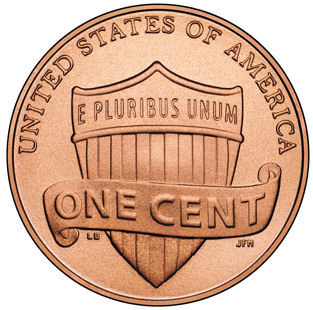
I envy my friend. I envy her that experience which she has yet to encounter. It is such a defining moment for a writer, it’s like Christmas and New Year’s and birthday all rolled into one. It’s that moment when we say, “YES! I did it!” It’s the culmination of years of work, but it’s also the open door to everything else we have imagined. For in that pivotal moment, the world has changed.
It’s a bright, shiny new moment, never to be forgotten.
I envy her.
Published on January 22, 2013 14:16
January 9, 2013
As a writer, I am often asked if I need a specific place ...
As a writer, I am often asked if I need a specific place or space to do my writing. That may be true for many writers, but for me the resounding answer is NO.
Since I’ve always had a day job, I’ve always had to carve out a little bit of time or space from my structured day wherever and whenever I could to write. I would write at home on weekends or evenings; at work I would write on breaks or lunch hours. In my early years I often wrote longhand on legal pads so I could take my writing with me anywhere and jot a few lines as the spirit moved me. I worked for the phone company for many years, so I have a lot of notes scribbled on customer service contact memos. I actually wrote my romance satire, The Pits of Passion , purely on breaks in the lunch room of the phone company. I used to go to break expecting to write, only to find that all the pages of my legal pad had been parceled out to everyone else on break so they could all keep up with the latest action. I had to hunt down the last page and take it forcibly so I could continue the story.
So having a quiet little bubble to write in was never an issue. I guess I’m lucky that way, or unlucky. Not having the “right” environment has never stopped me, but then again, I don’t have any excuse (not the right lighting, not the right temperature, not the right ambiance) to not write.
Recently I found myself thinking about that perfect place to write. My husband and I were lucky enough to spend a few days after New Year’s at our favorite place on the planet—the Grand Canyon. We had rented a cabin only steps from the South Rim. In the winter there are much fewer tourists around than during the summer, so it was almost idyllic. However, it was frickin’ freezing! The low in the morning was -2º; the wind chill took it to -10 º, but if we were lucky, it warmed up to maybe 28 º during the day. Now, I’m not a native Arizonan, but after 25 years in Tucson, I’m pretty spoiled by mild winters the rest of the country only dreams about. Trying to hike snow-covered trails in -10 º slashing wind is not exactly my definition of relaxing. We’d hike for a bit, feel our faces and fingers begin to go numb and duck into a restaurant for a cup of hot. Later we’d go out and face the wind again, but it really had to be taken in small doses, and those respites of toasty warm air and hot drinks felt like heaven.
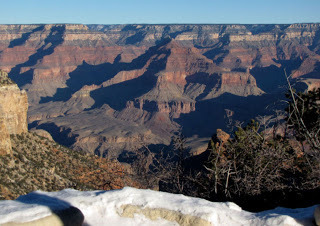
I got to thinking how nice it would be to have my own cabin and at times like this, have a nice warm corner with big windows that looked out over the canyon. Full view of this scenic wonder, a hot cup of tea, maybe a couple of cookies for good measure or my cat sleeping on my desk … I could go for that. I’m not reallysure how productive I’d be with that distracting view, but I’d sure like to try it out.
The best thing about the canyon is the solitude. Oh, I’m not talking about the area right behind Bright Angel Lodge where every tourist and their brothers gather to take that iconic picture on their cell phones. I’m talking about the wild spaces just yards down the trail where 99% of the tourists never go. When we were there, the most traveled areas were of course cleared of snow by the gazillions of feet that shuffled about, but we didn’t have to go very far before the trails were smothered in white stuff. Since we’re blessed with abundant sunlight here, the snow melts during the day and then refreezes at night, so there were plenty of places that were glassy with ice. It’s not hard to deduce that losing one’s balance at the edge of the Grand Canyon is not a good idea. Rather than take the slippery scenic rim trail, we opted for the deeper snow back amid the trees. The walking was easier and we didn’t have to be quite so careful. And it turned out we weren’t the only ones who thought that way.
We hadn’t been walking long when I wanted to stop and take a picture of the sparkly snow. Because of the low humidity here (single digits, usually), the snow tends to be powder dry, and the ice crystals sparkle like diamonds. It’s a beautiful phenomenon, but is hard to catch with a camera. Getting the right angle and the right light took some figuring. As I was working on that, my husband said, “Don’t move.”
What?
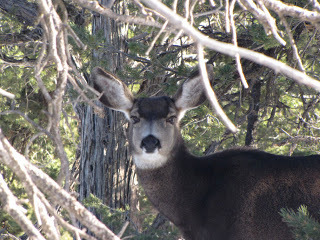
I looked up and saw the most gorgeous mule deer staring back at me. We’d inadvertently taken the same unofficial trail as a large mulie doe and her year-old son who was just barely sporting nubs on his forehead. Being very used to all the people that mill about the canyon, the deer were not the least bit afraid of us, although they did keep their distance as we moved closer to them. They simply wandered a bit further off, but continued their slow grazing on tufts of green that broke through the snow. We enjoyed their company for many long minutes, taking plenty of pictures, then moved off to leave them in peace. It was time again to get out of the cold and back into the warmth of a cozy room.
Grand scenery, the peace of natural places, the beauty of wild creatures … yes, I could write in a place like that.
Anybody got a cabin they’re not using?
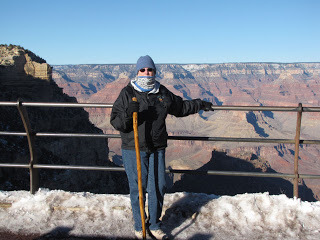
Published on January 09, 2013 14:33
December 21, 2012
The Power of Words
Over the past week, I have been struck by the battle of words that has raged across the media, both social and mainstream. It has been very similar in tone to the back-and-forth before the election, although it seems that recent events have touched people in far more emotional and core ways than that. That’s the good news; things of this nature should touch us at a very deep level. The bad news is that the activation of this core level has led to a deep divide in rationalizations, justifications and the search for solutions.
This blog is neither the time nor place to discuss violence in our country nor the cure for it.
But what I have been acutely aware of during the discussion is the use of words.
Language is a universally human trait. Yes, I know, animals have language, too, but since I don’t speak dolphin or chimpanzee, I can’t attest to the qualities of their languages. Our language, however, is an intriguing mix of describing facts and layering in emotion. It’s easy to imagine a man in the Stone Age saying (grunting?) to a friend, “Mammoth coming.” This simple observation of a fact is devoid of emotion, but when the man adds, “Run!” suddenly it’s a different story. And if he happens to add, “Run fast!” then the heightened emotion kicks the whole drama up several notches.
This very simple language of spare words has, over the millennia, evolved into a highly nuanced vehicle for conveying ideas. We no longer have to rely on simple adverbs (“Run fast!”) or adjectives (“Big Mammoth!”). We have now at our disposal an abundance of words that can denote any degree along a scale of emotion from mild to mixed to manic. It’s one of the most phenomenal qualities of words that they can convey passion, panic, longing, hatred, fear. It is exactly these qualities that make writing so powerful, both in the realm of story-telling and in journalism, for as words convey emotion, they can also promote it. Who can deny the rose-colored contentment felt after finishing a romance novel? Or the arousal induced by “adult” fiction? Inciting emotions is what pulls us into a story, what makes it relevant to us and what makes us care about the outcome. Words compel us to cheer Rhett Butler as he strides away from Scarlet; they instill in us to a righteous hope when Tom Joad says, “I’ll be there.”
Journalism, however, is not (most of the time) story-telling.
Journalism is supposed to be predicated on the truth. Journalism is supposed to be about gathering and presenting the facts of an issue. But words, those simple building blocks of communication, can like any tool be used for good or ill depending on the writer’s intent. They can be used to convey a message or incite emotion.
As an example, read the two sentences below.
He shot 20 children.He massacred 20 innocent children.
You may agree that one or both of those statements are factually correct, yet notice the difference in the emotional content. The emotionally loaded words take the simple statement to a new level. I am not making a judgment about either statement, or about the things that are currently being said and written, but I am, during this time of high emotion and fear, paying particular attention to the words that are being used.
Because words are powerful.
Published on December 21, 2012 12:31
December 5, 2012
Lessons Learned in 2012
The end of the year is always a good time to look back, take stock, figure out what we’ve learned (or not) during the course of the year. It’s one way to gauge how far we’ve come in the last 12 months. Some of the things I learned this year are:
How to sell without selling. Back in Marchafter the Tucson Festival of Books, I wrote about the process that moved me from being an isolated (and insulated) book writer/seller to being a connected part of the human race and forging links with readers. It’s amazing how much difference a change in perspective can make. Now I get to listen to other people’s stories. I get to hear about what’s important to them, what they remember, how they learn. It’s much more enjoyable to meet people person-to-person, reader-to-reader, rather than book writer/seller-to-customer.
Reviews/Awards/Criticisms. Back in August, I talked about reviews and how they can be ecstasy or agony for a writer. Any given book can elicit every reaction from a one-star “horrible” to a 5-star “perfect!” depending on the reader. Does that mean the book is horrible? No. That means, to that person, on that day and at that time, the book did not meet their needs, their expectations, their hopes and dreams. Does it mean the book is perfect? No. It means, to that person, on that day and at that time, the book did meet their expectations or even exceeded them. The book didn’t change; what changed were the readers. The experiences that shaped them and the filters through which they view the world are very different and something over which the writer has no control. What’s a writer to do? Write the very best book they can. Period. Adapting the “Think Globally, Act Locally” mantra, think Amazon #1, think NYT Best Seller list, think Oprah’s Book Club and the Today Show, but just write the best book you can. Don’t write what you think people want to read; don’t write for the market; write the story that wants to be told. Write the book you want to read. It won’t speak to everyone but it will speak to some. Give it the truest voice you can.
AFGEs. Life is a classroom. If we really think about it, we learn something new every day. It may be something as small as learning not to take a deep breath while eating a powdered doughnut, or as big as learning that cancer doesn’t care who you are or what you still want to do with your life when it points its boney finger at you. The fact is that we neverreach the head of the class. We alwayshave more to learn. And learning makes us a better person that we were five minutes ago. Unfortunately, we may not always like the lesson that’s being served. In AA they have an acronym for that: AFGEs. An AFGE is Another F***ing Growth Experience. AFGEs may not be the things we want to learn, but for one reason or another, they seem to be the things we need to learn. Whenever we are served up an AFGE, it may be a hard pill to swallow, but the quicker we swallow it, the quicker we will assimilate the lesson and move on to the next thing, a better person.
We’re all in this together. I’m an introvert; I think most writers are. For many years, I toughed out all the ups and downs of being a writer by myself. I went through the anxiety of submitting manuscripts to agents and publishers; I withstood the rejection letters and rejoiced in the acceptance letters. I fumbled and fell into the pit of a vanity press. I discovered pay-to-publish and then, finally, self-publishing. I taught myself the process of formatting a book for publishing, designing the cover, writing the blurbs. I worked out how to format a story for e-books. Then, everything changed. I discovered writers’ forums online. I jumped into Goodreads and LinkedIn with the joy of an ugly duckling who finally finds where the swans hang out. I made fan Facebook pages for all my books and began to discover all the other writers and writers’ groups there. The culmination (so far) has been WANA, the We Are Not Alone forum created by Kristen Lamb. Finding community like this has been a game-changer. I am not alone. I am but one of many, many writers who toil and pour their hearts out and hope for a kind word for their children stories. It’s a new experience, but we’re all learning that cooperation works better than competition. Supporting each other works better than suppressing each other. Together we can bring our stories to light. Together we can raise them up and deliver them to the world. Together we can ensure that the stories that need to be told are being told.
It’s a great feeling.
Published on December 05, 2012 08:56
November 19, 2012
Please, Please -- Write it Down!
I love genealogy. I thought the aptly-named “Who do you think you are?” was the best show ever on television. Watching celebrities that I liked and with whom I felt some connection struggle with their own searches, digging ever deeper into family secrets, family questions and mysteries, was something that I looked forward to all week long. Seeing the awe on Mathew Broderick’s face when he stood on the Civil War battlefield where his great-great grandfather fought; watching Sarah Jessica Parker’s flood of relief when she found out her great-great-grandmother (arrested for witchcraft in Salem) was never brought to trial since the witch trials were shut down as she awaited her turn; seeing the joy on Emmet Smith’s face when he visited the village in Africa where his forebears lived before being taken as slaves to America—it all serves to keep the history alive. No longer dry facts in dusty books, the history becomes real stories of real people who loved and cried and fought to determine their own destiny.
I didn’t always love genealogy. As has probably happened to a great many people before me, I was plunged into it rather suddenly when both my parents died. Suddenly I was poring through papers and seeing photographs that I had never seen before, wondering who these people were and how they were connected to me. It was immediately overwhelming, inspiring and fascinating.
Luckily for me, I still had an aunt who could help me put some of the pieces together. She could put names to the photos that were blank on the back, and she was able to tell me that my great-grandmother’s maiden name, Keyes, was not pronounced "Keys," but “Kize,” as in “eyes” with a K in front of it. I was lucky to have her for a brief 7 months longer, as she was the last of her generation. Now there is no one left to ask.
Doing my own research from there, I discovered several online sites where people can search for data and assemble family trees. The great thing is that people can share trees, sharing pictures, stories, data and connections back and forth, ensuring that late-comers don’t have to re-invent the wheel as they start their own family investigations. It’s a great community, helpful and supportive and similarly obsessed.
For some reason, there’s a huge sense of satisfaction in adding to the family tree, adding a name, adding the dates of birth and death. But there’s an even greater satisfaction in uncovering the stories between the dates. This is where the real gold lies. I find it fascinating to discover the people who made dangerous and sometimes desperate journeys to find a new beginning. I love reading about people who challenged the odds, who envisioned freedoms and opportunities only dreamed about, who struck out alone or with young families to find a better way. It was amazing to read about my multi-great-grandfather who had been impressed into the English Navy only to find himself at anchor on the east coast of the new America. Not allowed to go ashore, he and a handful of other men devised a plan whereby they requested to be allowed to take a small dory out for exercise. For three days they did this, coming back to the ship each evening until finally, on the fourth day, they rowed directly for the new land and disappeared within it. Changing his name to avoid capture, my forefather plunged deep into the wilds of the new land and built a new life with nothing but his own dogged determination.
The point I want to make is how valuable these stories are. And I don’t just mean the ones from centuries ago. I mean the stories we hear now from fathers, mothers, aunts, grandparents. Every family has them, but they seldom get written down. That’s the tragedy. When the main storyteller passes on, those stories often pass with them. Oh, they’ll be remembered for a few years, maybe retold a few times by the ones who heard them originally, but then they’ll be lost. And that’s a loss not only for the family but for humankind.
Luckily, in this day and age, it doesn’t have to be that way. With computers, it’s easy to write things down, print copies for family, even e-mail them to distant cousins. The stories don’t have to be in any particular format, they don’t have to be in a formal style. Just get the main characters down, the main activity, the places and dates. I know most people find writing difficult, but just jotting down notes is enough, at least for a start. And it could lead to a whole lot more.
The good news is that, with self-publishing options today, family stories can be published as real books for very little money and a little bit of effort. If you’re read my other blogs, you know that you can publish a quality book for just about $10. Yes, $10; I know because I’ve done it.
So this Thanksgiving, when you’re all sitting around the living room enjoying a piece of pumpkin pie and hearing the old family stories, do us all a favor and write them down. Make it a family project and ask everyone to write one story they enjoy. Collect photos to enhance the stories, maybe add newspaper clippings if any exist. You might be pleasantly surprised by the gems you uncover.
And if you’re really inspired, you might end up producing a book that could live on well past the storytellers. You just might find yourself adding to the infinite history of the human race.
How cool is that?
Published on November 19, 2012 12:55
November 16, 2012
Giveaway!
The true story behind my award-winning biography Marcia Gates: Angel of Bataan is being highlighted in a documentary called "Our Wisconsin: A Military History of America's Dairyland." It airs Friday, Nov. 23 from 7-8 p.m. on WKOW-TV in Wisconsin. If you're in the broadcast area, please tune in.
In honor of this recognition, I have posted a giveaway on Goodreads.com; please enter if you would like a free copy of the book.
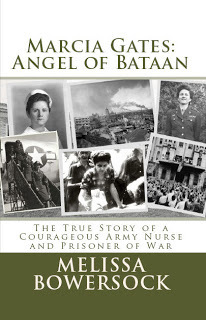
The book was recently awarded an Honorable Mention by the Military Writers Society of America and continues to touch people with its true story of courage and dedication.
Watch the book trailer below or go here.
And good luck!
In honor of this recognition, I have posted a giveaway on Goodreads.com; please enter if you would like a free copy of the book.

The book was recently awarded an Honorable Mention by the Military Writers Society of America and continues to touch people with its true story of courage and dedication.
Watch the book trailer below or go here.
And good luck!
Published on November 16, 2012 06:20
November 6, 2012
Life Gets In The Way
Like most of us, I have lots and lots of good intentions. I’ve gotten so many thanks and nice comments from other writers about my self-publishing experiences and I strive to keep adding to it but, sometimes, life just gets in the way.
First off, I am planning to retire. Not from writing; just from my day job. It’s still months away, but I have about a zillion ducks to get in a row, so I’ve been chipping away at it. I need to get with the Social Security office and find out what I need to do and exactly when I might expect my first check. I need to investigate alternate health insurance and get that set up. I need to get with my HR department to find out what I need to do there. My boss already knows my plans and at some point we’ll have to advertise my job and arrange time for me to train my replacement. And to make matters really interesting (read: chaotic), my husband and I are planning to move three hours north to a smaller town just as soon as humanly possible.
The good news is that this is all months away, so I’ve got plenty of time and am not frantic—yet. The bad news is that this is all months away and I want it now! Talk about a serious short-timer attitude …
Amid all this, I am still thinking about my latest WIP, and I occasionally bug out a knotty twist of plot or refine a transition. Sitting down to actually write just seems harder. I guess my brain is just not quiet enough to concentrate on one thing only right now. It’s too used to going in 27 different directions.
Then there’s the election. I don’t normally get too psyched up about elections, but this one seems particularly important. Maybe it’s the polarization of our country over the last 10 years, but it seems that the choices are so diametrically opposed and that the downsides are so potentially worrisome. My father used to say that he really didn’t think it mattered too much who was in the White House; life just seemed to continue on in its own rambling fashion. And I used to think he was probably right, but not since the financial meltdown of the mid-2000’s. Now it seems like it matters desperately who’s in the White House. There’s a part of me that thinks the outcome of this election is a given (with my candidate winning), but there’s also a part of me that is terrified that the other guys might actually steal the election. I try to remain calm but at times the anxiety seems to spike and I’m completely worthless at writing. At those times, the only places that benefit from my talent are Facebook and Twitter. Not exactly the full-length novel I’d prefer.
However, over the decades that I’ve been writing, I have realized that I am a decidedly undisciplined writer, and I’m okay with that. I do not sit down and write at the same time every day. I do not even sit down and write every day. I write when the spirit moves me. I’ve learned that writing at any other time is simply a waste of time, as whatever I end up with is flat and dead and useless to me. So in that respect, I am very disciplined at being undisciplined. I don’t expect to write every day. I don’t even expect to write every week. I know things will calm down, things will simplify, life will get less hectic—and I will write again.
Just not now.
Published on November 06, 2012 13:22

